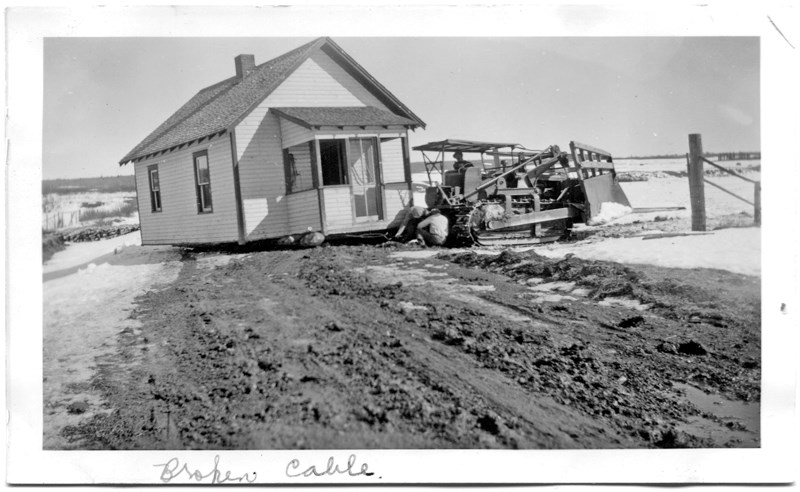When my parents, Elden and Helen Spicer, married in late 1944, they didn't give much thought to their unfolding future, where they would live and make their home over time. Mom was already working as a “hired girl” as she called it. She was a live-in housekeeper, cook, sometimes nanny.
Dad was also employed by various farmers, doing chores, learning carpentry skills and animal husbandry. When they married, he was employed by Norman Cook, local MLA in the Westward Ho area. He was provided with a bunkhouse, a small cabin with at least two rooms, very tiny. The minuscule home had its attached front veranda with screen door. From photos taken after the wedding, there appears to be two large dishpans or washtubs hanging in the porch. The need for extra storage suggests that the kitchen facilities were limited.
Dad's own childhood home in the Saskatchewan of the “dirty thirties” sounded as though it wasn't larger or grander than the couple's first home. Several of my siblings recall brief visits to the Saskatchewan site, one of many abandoned rural buildings on the Prairies. When Larry went to the area on his search for family history, that dwelling was no longer there. The Prairies were still dry, barren and forbidding.
Mom's family roots were in the Aldersyde-High River area. The original farm is still intact, a functioning farm, although rather down at the heels. When Mom's family left the region, she remained for awhile, working there keeping house for her bachelor uncle. She gained her skills from her mother and also her grandmother, who lived in rotation with her three surviving children once she was widowed.
When the folks married, they never considered what each of them brought with them: shared knowledge, diverse background and experience. Mom didn't talk much about her past until later in her life as her immediate lifestyle kept her too preoccupied to reminisce.
I did look through her bridal book and noted items much different to shower and wedding gifts of today. She received a few tea towels, probably homemade; a cast iron frying pan. A wool blanket, handcrafted quilts. The MLA employer gave them a $10 bill, quite an event. The young people who were their friends took a collection and also gave a gift of money. They couldn't recall how much, but it purchased a set of nice china. The remnants still reside in my china cupboard, the greater part of a set of eight with miniature pale pink roses on a white background. The label says “Harmony Rose.” Very fitting for Mom's gentle nature.
That little bunkhouse originally sat alongside a small creek bed, one that chose to overflow each spring. The site was on another section, not far from Mr. Cook's home place.
Dad's snapshot of the cabin being moved from the location shows winter fields, a muddy trail and the caption “broken cable.” The photo is too small to identify the driver of the caterpillar but the little house is in sharp detail. It reminds me of the current craze of “tiny house” builds. This specimen is on skids but is obviously not meant to be mobile.
I asked mom about the move but she was unsure. Presumably the new site was on the home quarter as Dad was the hired man. I'm not aware of how long they lived and worked there. Dad admired Mr. Cook, a confident, fair employer. Dad always loved the area, with its treed, rolling hills: a distinctive rural Alberta beauty.



